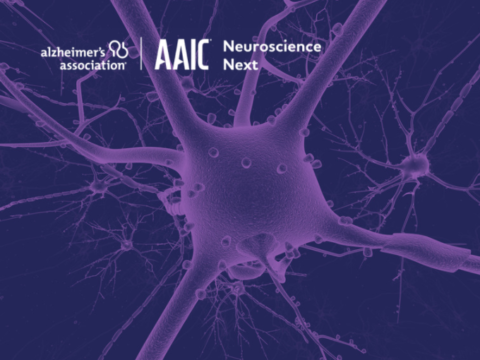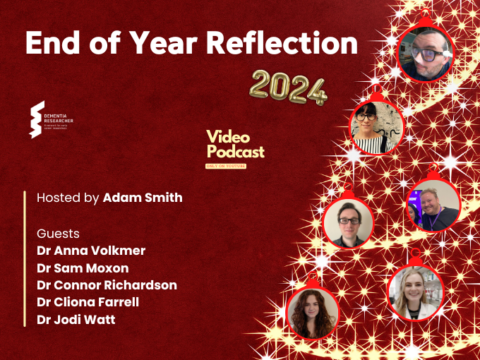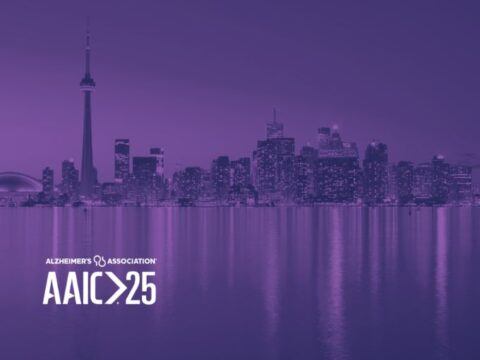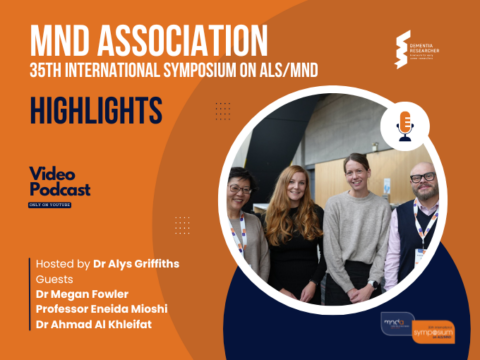A five-part special relay podcast series, where the interviewee becomes the interviewer. With five leading researchers discussing their research, their field, and the work of the Alzheimer’s Association ISTAART Professional Interest Area they represent.
Part Two – Professor Henrik Zetterberg interviews Dr Prashanthi Vemuri
Henrik Zetterberg is Professor of Neurochemistry, Senior Consultant in Clinical Chemistry and Head of Department at The Sahlgrenska Academy within the University of Gothenburg, Sweden, and University College London, UK. Henrik’s work is focused on Fluid biomarkers for neurodegenerative dementias. He is representing the Biofluid-based biomarkers PIA.
Dr Prashanthi Vemuri is Associate Professor of Radiology at The Mayo Clinic College of Medicine and Science, Rochester, USA. Prashanthi’s research is focused on imaging biomarkers of Neurodegenerative and Cerebrovascular Disease. She is representing the Reserve, Resilience, and Protective Factors PIA.
The Alzheimer’s Association International Society to Advance Alzheimer’s Research and Treatment (ISTAART) convenes the global Alzheimer’s and dementia science community. Members share knowledge, fuel collaboration and advance research to find more effective ways to detect, treat and prevent Alzheimer’s and other dementias. Professional Interest Areas (PIA) are an assembly of ISTAART members with common subspecialties or interests.
There are currently 25 PIA covering a wide range of interests and fields, from the Alliance of Women Alzheimer’s Researchers (AWARE) PIA to Biofluid Based Biomarkers and everything in between.
To sign-up to ISTAART and a PIA visit www.alz.org/istaart/
Adam Smith:
Hello and thank you for listening to our ISTAART PIA Relay Podcast series, brought to you by NIHR Dementia Researcher. ISTAART is a professional society and part of the Alzheimer’s Association, representing scientists, physicians and other dementia professionals active in researching and understanding the causes and treatments of Alzheimer’s disease and other dementias.
Adam Smith:
In this five-part series, we’ve asked members of ISTAART professional interest areas to take turns at interviewing their colleagues and being interviewed themselves. Confused? Don’t worry, it’ll all become clear as the week progresses. We will be releasing one of these podcasts every day in the build-up to the Alzheimer’s Association International Virtual Conference to showcase the work of ISTAART PIAs. Thank you for listening.
Professor Henrik Zetterberg:
Hello everyone, and thanks for joining us in this podcast. I am Henrik Zetterberg, Professor of Neurochemistry at University of Gothenburg and University College London, and I chair the Biofluid Based PIA. And today I’m delighted to introduce Professor Prashanthi Vemuri to you. And I will actually start by asking you to present yourself, Prashanthi, please.
Dr Prashanthi Vemuri:
Thank you, Henrik. My name is Prashanthi Vemuri. I’m an associate professor at Mayo Clinic, and I am the chair of the Reserve, Resilience, and Protective Factors PIA. And I’m delighted to be here and talk to you a little bit about what we do, both at PIA as well as in my dementia research work.
Professor Henrik Zetterberg:
That’s great. And I can also say upfront that I’m super excited by this because the theme of your PIA, it’s quite positive, isn’t it?
Dr Prashanthi Vemuri:
Absolutely. So, we study how people can really age well, how can people be more resilient in terms of their cognitive performance, and how do they have exceptional brain health. And so it’s a very positive thing, and we try to identify mechanisms and lifestyle factors that contribute to people really being able to age well. So it’s a positive thing, absolutely, Henrik.
Professor Henrik Zetterberg:
So how do you address mechanisms in these studies? I think that is an exciting topic.
Dr Prashanthi Vemuri:
Yeah, absolutely. So, we look at mechanisms from two perspectives. One is how we design the study. So, there’s a lot of heterogeneity in the way people age. There is subset of people who do not have any pathology in their brain. So they’re able to avoid pathologies or resist pathological changes in the brain. Some of us are study how people are able to do that, how people are able to avoid amyloid and tau, the primary proteins in Alzheimer’s disease.
Dr Prashanthi Vemuri:
And then some of us look at people who are really old and really have excellent brain health, cognitive performance, and memory. And we try to understand what was in their lifestyle and how are they able to maintain this cognitive performance very well. That’s one aspect of it. Good study design to try and get at lifestyle factors that might contribute to better performance.
Dr Prashanthi Vemuri:
The second part of what we do is a lot of us look at biomarkers, genetics, other factors, imaging mechanisms, for example, and try to follow people over time. What brain changes are they having and how are they able to compensate or how are they able to cope or be resilient to those changes? So it’s both the study design as well as tools that we use such as biomarkers, imaging, and genetics, together.
Professor Henrik Zetterberg:
Hmm. So when thinking about the research questions here, then your PIA must be quite broad in terms of expertise, right? I guess there are geneticists, biomarker people, imaging people, clinicians, psychologists.
Dr Prashanthi Vemuri:
Absolutely. This is one of the very broad teams that I’ve seen. And I don’t know if it’s still true, but beginning of this year, last year, we had an estimate of how many people are in the PIA. So we interact with about 600 people, belong to the PIA, and we have people from all aspects of dementia, as you can imagine. People who are interested in lifestyle interventions, neuro-psychologist images, CSS, blood biomarker people. There’s a lot of cross overlap with all the peers that exist within ISTAART.
Professor Henrik Zetterberg:
Hmm. So how far have you come in this research? How much is genetics and how much is lifestyle?
Dr Prashanthi Vemuri:
So I think if we put everything together, we are able to probably explain 30 to 50% of the variability completely, not 100%. But the goal is to get to 100%. So if I had to give an estimate, we do pretty decently with 30 to 50% just based on lifestyle, genetics, and if you add the imaging changes, for example, you would push it about 50%.
Professor Henrik Zetterberg:
What are your main objectives now with your PR work during the coming years? What are the biggest research topics you think will need to be studied in your group of researchers?
Dr Prashanthi Vemuri:
So let me just give you a little bit of history of what we did in the last couple of years, so I can tell you where we are going. So Yaakov Stern, who was the person who coined cognitive reserve, and he was the founding chair of the PIA with the intention of bringing together people who are interested in cognitive reserve, resilience, and protective factors in Alzheimer’s disease. And so the first thing when the PIA formed is that we got together. A lot of us were involved in writing a white paper on how we define terms in the field. So this was published in Alzheimer’s and Dementia in 2018. And subsequently after the publication of that, we heavily got involved in this NIH-funded Collaboratory, which was again, led by Yaakov Stern to try and help the field understand the mechanisms of reserve and resilience and what should be …
Dr Prashanthi Vemuri:
The next step, as we see is that we are working on a white paper on study design, research methods, that people in our field use. So we reached out to every member in our PIA and tried to understand what kind of terms do they use and what kind of study designs they use so that we can make it available to everyone to look at the study designs we use in reserve, resilience and protective factors.
Dr Prashanthi Vemuri:
That’s our first go, to try to get and understand the complexity of the research methods we use, make it available to everyone, we were working on the white paper. The second is, we are going to try a lot to improve the participation of early career researchers. So we have modified our AAIC scientific session quite a bit. So we have a [inaudible 00:07:48] competition, we have the thesis competition, and we’re also exploring how we can reach on to mentees who are much younger and encourage some pairing with a mentor and increase participation in our PIA. And we also plan to expand our PIA’s outreach through newsletters and social media.
Professor Henrik Zetterberg:
Are you also involved in cross-PIA collaborations? I could easily see some biomarkers working in good synergy with what you are doing, and-
Dr Prashanthi Vemuri:
Absolutely, we have a lot of cross-PIA collaborations. We had one that … the disparities PIA, Diversity and Disparities PIA, and this year we have a session where we’re presenting at the Perioperative Cognition PIA. And we’re trying to help different PIAs as well as absorb concepts from different PIAs that will help us look at mechanisms.
Professor Henrik Zetterberg:
Are you also planning for intervention studies or is that a future topic?
Dr Prashanthi Vemuri:
I think it is a future topic. It’s still in nascency, the interventions, and we hope to touch upon it and look at it deeply in the future.
Professor Henrik Zetterberg:
How are you planning now for the upcoming AAIC? We will be virtual, and of course the PIA work has been a lot about networking and putting people in contact with each other to stimulate new projects and research starting. How have you worked on that to make that happen?
Dr Prashanthi Vemuri:
Yeah, so it’s a work in progress. We have fantastic 90 minute pre-recorded talks. We’re trying to get a lot of younger generation folks to come and participate because there are going to be competitions. So we are reaching out to them, asking them to submit abstracts, but we also have a section where we try to bring in experts on the fray. For example, Michael Valenzuela, he’s worked on the WHO consensus of cognitive reserve, which is being run by International Federation of Ageing. So we’re trying to bring some experts in and David Bartres who’s a vice chair in our group, he’s going to present on how we are planning the white paper on research methods. So all of us are going to do a mix of senior and junior investigators. So that is going to be very-
Professor Henrik Zetterberg:
Can I ask you a little bit about your research career also?
Dr Prashanthi Vemuri:
Absolutely. So I’m an imaging scientist and I lead a translational team at the Mayo Clinic and we mainly focused on of course, resilience research. But the question we ask is what are the pathways to exceptionally age? So I’m not in my fifties yet, but all of us want to reach eighties and nineties and maintain excellent brain health. Be sharp, have great memory and cognition. So we tried to develop and leverage imaging technologies to capture early changes in the brain, be it vascular disease, amyloidosis, tau, or age related changes. We try to look at all of them, model them, and try to understand and solve the puzzle of cognitive decline.
Professor Henrik Zetterberg:
How did you get interested in this topic?
Dr Prashanthi Vemuri:
So the first thing is, I really didn’t choose dementia. Like you said, Henrik, serendipity! When dementia chose me … I’m an engineer by training, so my bachelor’s was in engineering. But when I had gone into my doctoral work, I was interested in how to develop really innovative MRI technologies to visualise tiny blood vessels in the brain. That was my first interest in doctoral work. And then when I looked at the postdoctoral experience, I really wanted to get into a field, which was really translational. And you would agree Henrik, that our field, especially the group of people that across the whole world who are involved in this research, it’s a highly translational effort trying to get better technology, detection methods, into dementia, treatment of dementia. Intervention and prevention. So I interviewed with Cliff Jack at Mayo Clinic and rest, as you say, I just got lucky and I went with the flow and I’m really enjoying the ride.
Professor Henrik Zetterberg:
It’s an amazing field to work in. I also have gotten the sense that it’s … of course, it’s sad that we haven’t had the real breakthrough in terms of treatment yet, but that’s also humbled the field to some extent that we need to realise we need to work together to make this happen. And of course, then also lifestyle and anything that could help, to be of great value. It’s-
Dr Prashanthi Vemuri:
Do you think … you’re much more senior than me, do you think we’ll solve it by 2040?
Professor Henrik Zetterberg:
Yeah. Yes. We have to because otherwise it’s, yeah. Actually, I can’t help but hoping that we would get the treatment approved in the next few years, but that is more wish and hope of course, than perhaps … and what I hope for is that perhaps such an approval could unlock the situation we are in at the moment that we could potentially learn from starting, to be able to prescribe something. But I mean, this is almost not scientific, but I think we are in an exciting time. And also with all the imaging technologies you have developed and your colleagues and the biomarkers, and now also the blood biomarkers, genetics and everything else that is known about brain function, lifestyle, and all those things. I really feel like we have learned a lot and that that should translate into something that one could give to people at early stage disease. Of course, I would love to prevent this from happening altogether, of course.
Professor Henrik Zetterberg:
What do you think, what is most helpful in terms of resilience and factors, you could do something about yourself? What would you say?
Dr Prashanthi Vemuri:
It’s a factor that is hard to do. It is good sleep, low stress, being involved in, intellectually stimulating activities, are all good things that help with reserve resilience. But the problem is sleep and stress is hard, to get a good night’s sleep and not have stress, because there’s a lot to go around. But I think we can, in terms of intellectually stimulating activities, being scientists and the early stage investigators are listening to this, I’m in a good spot because we’re always constantly working on new problems and we mentally challenge ourselves. So I think we are building reserve and resilience that way for sure.
Professor Henrik Zetterberg:
Yeah, yeah. That’s nice to hear actually. But the sleep is a bit worrying.
Dr Prashanthi Vemuri:
Yes, it is.
Professor Henrik Zetterberg:
Yeah, yeah. I also think that sleep is so interesting, both from a neurophysiological standpoint, but also these clearance mechanisms and sleep is such a fascinating topic altogether, I think, because it must be … I mean, of course it’s super dangerous to sleep. You can be eaten up by … you are defenceless, but we sleep. We need to sleep. And if you can’t sleep, of course, you get super ill from it. I think I sleep a little bit too little. I’ll try to work on that.
Dr Prashanthi Vemuri:
That’s great to hear, Henrik.
Professor Henrik Zetterberg:
Yeah. And so where would you say that … thinking about the young researchers and someone trying to choose a PhD topic, what would you recommend from your perspective?
Dr Prashanthi Vemuri:
So couple of things for younger investigators who are trying to choose topics. The first thing is choose something that really interests you. PhD is the first vehicle to try and get good at problem solving. And then second is don’t think that this is your topic for your life. So don’t be too focused on picking a topic that you really want to keep going. As scientists, we evolve over time. The work I’ve done has evolved over … like I was an engineer by training, I went to the imaging technologies. And now I’m doing a problem that really excites me and gets me out of bed. So don’t feel like you’re married to that topic all your life. But really, in your PhD, focus on problem solving really well. Understanding how science works and develop a method to how you approach problems. I think that will help you throughout your life as a scientist.
Professor Henrik Zetterberg:
That’s almost like learning the craft of scientific work then. And that is during the PhD time.
Dr Prashanthi Vemuri:
Yeah.
Professor Henrik Zetterberg:
I agree completely. That’s what it was like for me as well, I think. I started, Epstein-Barr virus and lymphoma stuff was my PhD topic. So it was not until I started to specialise in clinical chemistry as a medical doctor, then I met [inaudible 00:17:26] over here in the lab and he helped me with the writing recommendation. He told me about Alzheimer’s disease biomarkers inside CSF, and then he helped me networking so that I could get the good postdoc position. And that was an important step for me. So what’s your advice for the postdocs? The people who have defended their thesis and they are about to give it to become a postdoc?
Dr Prashanthi Vemuri:
So I would say network a lot. Like you said, Henrik, we are what we are because of the network that we have of scientists who we can go and ask questions. Don’t be shy talking to someone. And advice for everyone, you would agree that … choose mentors that support you, and you should constantly revise that and realise that people are generally flawed, sometimes. Even I make mistakes. So choose for multiple people that you can learn good things from, right? Pick up good habits and good scientific skills from. So I would encourage them to reach out to people, senior people like you, Henry. It’s amazing that I could talk to you and our field is pretty open that I can come up to you in a conference and say, “Henrik, I read this paper, and I thought this was very exciting.” So I think you appreciate don’t you agree? As senior scientists, we appreciate people reaching out to us.
Professor Henrik Zetterberg:
I agree completely. And also this recommendation not to be shy because … if you’re listening, if you are a PhD student and you think about something that you would like to address, then finding out who does the best work on that particular topic and discuss with that person or that group directly. I think from experience, I could tell that most often you would be welcomed with open arms. No one would say that, “Here comes a person who is asking questions about something, I do not have time.” It’s not at all like that! I think it’s really on the contrary. But then in science, it’s also competition. Do you have a reflection on that, Prashanthi? How much should one promote oneself and how much should one collaborate and is there a balance there to consider?
Dr Prashanthi Vemuri:
I think there’s definitely a balance. I always tell students that we are two ends of a spectrum, like being a good scientist. There’s one spectrum where you are only focused on science and the other spectrum where you’re a great manager, a great networker. You have amazing collaborations, work on people, relationships, and all of us are somewhere in the middle and we are on different spectrum’s of that, being a good scientist and a great networker and collaborator. I think you should devote time to being a good scientist and spend time with your mentees, think and reflect on what you want to do. But if you lose track of that and you’re drawn much more to the other side, then you are caught up in this cycle where it’s hard to realise why and be excited about why you came into science. So I think you’re right, Henrik, there’s a balance. And I’m sure you do the same thing. Do you?
Professor Henrik Zetterberg:
What I have taught about throughout the years and also tried to recommend, some people have asked me, is to learn something, especially to learn a technique, to learn a tool, to refine something so that you really can contribute data. And then when you have learned something, which is a little bit unique, and of course you will then teach other people how to do it also if it’s useful. Then if the data generated are good, they will be of use and that will initiate collaborations and you would be able to contribute your core expertise all the time. It’s sort of trying to build a core expertise in yourself. And then from that, one can be on very steady ground to collaborate and enjoy this scientific environment.
Dr Prashanthi Vemuri:
Completely agree with you.
Professor Henrik Zetterberg:
And when you look forward to the next year only, what are your plans then?
Dr Prashanthi Vemuri:
Next year, a lot more focus on mechanisms. We are trying to look at imaging based mechanisms of how people have greater reserve and resilience. So I’m pretty excited about the studies we have designed. We’ve added genetics to our studies, so I’m excited about that.
Dr Prashanthi Vemuri:
So yeah, a lot to look forward to in my team, but for the PIA I’m excited as well. I see more and more involvement from junior members in our group. We have some junior colleagues in the PIA, who just graduated with a PhD, were taking a lot of leadership roles. So I see mentoring them as well as mentoring mentees in my group, as one of the interesting thing that’s coming up.
Professor Henrik Zetterberg:
I think this sounds great, Prashanthi. I think I will ask for becoming a member in your PIA when I circle out of the BBB PIA.
Dr Prashanthi Vemuri:
Yahoo! We got the first member!
Professor Henrik Zetterberg:
Good. Is there anything you would like to add now, Prashanthi?
Dr Prashanthi Vemuri:
So I would suggest that we should just totally go with the flow and try to enjoy being a good scientist and work hard at it.
Professor Henrik Zetterberg:
I think that is a wonderful final statement here. So I thank you a lot, Prashanthi Vemuri and I wish you best of luck now with the upcoming AAIC meeting and the upcoming work. Thank you.
Adam Smith:
Thank you so much for listening. You can find details and profiles, on today’s panellists and information on how to become involved in ISTAART on our website at dementiaresearcher.nihr.ac.uk, and at www.alz.org/ISTAART.
Adam Smith:
We’ll be back tomorrow with the next recording of [inaudible 00:23:52] ISTAART PIA Relay Podcast series. Finally, please remember to subscribe, like, and review our podcast on iTunes, Spotify, and all the other places where you find your podcasts. Thank you.
END
Like what you hear? Please review, like, and share our podcast – and don’t forget to subscribe to ensure you never miss an episode.
If you would like to share your own experiences or discuss your research in a blog or on a podcast, drop us a line to adam.smith@nihr.ac.uk or find us on twitter @dem_researcher
You can find our podcast on iTunes, SoundCloud and Spotify and where ever you get your podcasts.
Finally, the views and opinions expressed by guests in this podcast represent those of the guests and do not necessarily reflect those of NIHR Dementia Researchers, PIA membership, ISTAART or the Alzheimer’s Association.

 Print This Post
Print This Post





